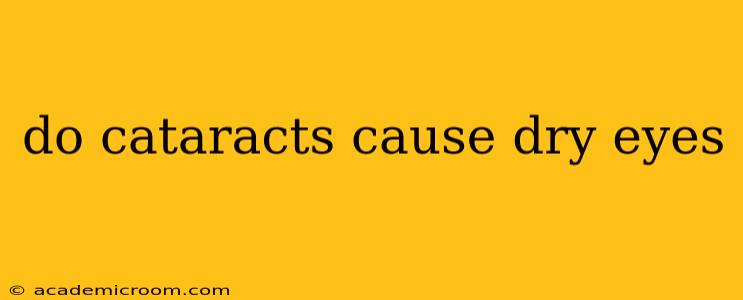Do Cataracts Cause Dry Eyes? Understanding the Connection
Cataracts and dry eyes are both common eye conditions, often affecting older adults. While they are distinct conditions, there can be a perceived connection, and understanding the relationship is crucial for proper diagnosis and treatment. The simple answer is: cataracts themselves do not directly cause dry eyes. However, the symptoms of cataracts can sometimes mimic those of dry eyes, and the presence of cataracts might indirectly influence tear production or evaporation. Let's delve deeper into this nuanced relationship.
What are Cataracts?
Cataracts are a clouding of the eye's natural lens, leading to blurry vision. This clouding occurs gradually over time and is typically associated with aging. Other factors, such as diabetes, eye injuries, or certain medications, can also contribute to cataract development. Symptoms include blurry or cloudy vision, faded colors, increased sensitivity to glare and light, and difficulty seeing at night.
What are Dry Eyes?
Dry eyes occur when your eyes don't produce enough tears or when the tears evaporate too quickly. This can lead to a range of symptoms including burning, itching, stinging, a feeling of grittiness in the eyes, blurry vision, and increased sensitivity to light. Many factors contribute to dry eye, including age, certain medications, environmental conditions (like wind and dry air), and certain medical conditions.
Can Cataract Symptoms Mimic Dry Eye Symptoms?
This is where the confusion often arises. Both cataracts and dry eyes can cause blurry vision and increased sensitivity to light. A person experiencing these symptoms might initially assume they have dry eyes when, in fact, they have developing cataracts or vice versa. The key difference lies in the underlying cause of the blurry vision. With cataracts, the blurriness is due to the clouded lens, while with dry eyes, it's due to insufficient lubrication and moisture on the eye's surface.
Can Cataract Surgery Affect Dry Eyes?
While cataract surgery itself doesn't directly cause dry eyes, it can sometimes exacerbate pre-existing dry eye conditions or even trigger new ones. The surgical procedure, particularly the use of certain medications or instruments, can temporarily disrupt the delicate balance of tear production and evaporation. Many patients report experiencing temporary dry eye symptoms after cataract surgery, but these typically resolve within a few weeks or months.
How are Cataracts and Dry Eyes Diagnosed?
A comprehensive eye exam is essential for diagnosing both cataracts and dry eyes. For cataracts, your ophthalmologist will perform a visual acuity test and examine your lens for clouding. For dry eyes, tests like a tear film breakup time test or Schirmer test may be performed to assess tear production and quality.
What are the Treatments for Cataracts and Dry Eyes?
Cataract treatment typically involves surgical removal of the clouded lens and replacement with an artificial intraocular lens (IOL). Dry eye treatment varies depending on the severity and cause. Options include artificial tears, prescription eye drops, punctal plugs (to reduce tear drainage), and in some cases, more advanced treatments like IPL (intense pulsed light) therapy.
Do I need to be concerned if I have both Cataracts and Dry Eyes?
Having both conditions isn't unusual, especially among older adults. It's crucial to address each condition separately with appropriate treatment. Your ophthalmologist can help you manage both conditions effectively, ensuring you maintain good vision and eye comfort. Early diagnosis and treatment for both cataracts and dry eyes are essential for preserving your vision and overall eye health.
